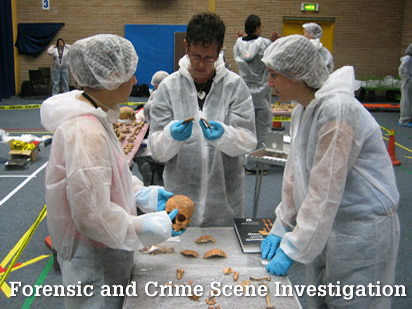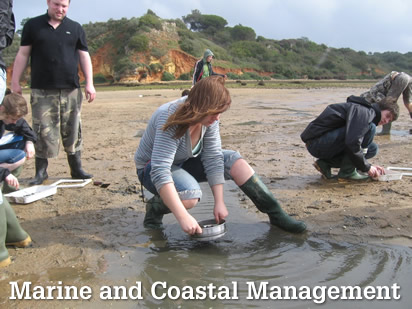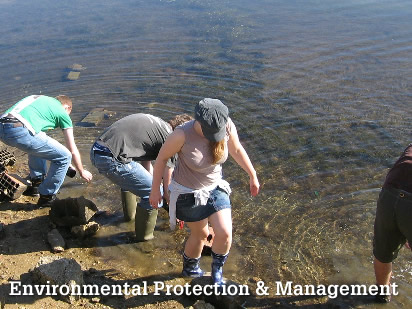Investigate the exciting new CS Course Titles

Conservation Sciences has three exciting new course titles for 2008/09. Read on for more details on your preferred option. Course specific details and requirements are found in the links at the foot of the page, or contact us for further information.
View Course specific information below:- Forensic and Crime Scene Investigation
- Marine and Coastal Management
- Environmental Protection & Management

This course provides theoretical and practical training and covers crime scene investigation, legal issues, and relevant science. It draws on the School's international reputation for forensic archaeology, anthropology and genocide investigation.
There has been a rise in the use of forensic investigation in many fields, involving civil and criminal processes, throughout the world. This requires an understanding of forensic skills such as ballistics analysis, fire investigation and biohazards, as well as evidence recovery and handling procedures.
The need for appropriately trained staff in a range of organisations is increasing. With the creation in the UK of the Central Register of Forensic Practitioners, the need for an adequate tertiary education provision is highlighted.
This course is aimed at students with a scientific background and a desire to establish a career in forensic science in some capacity (e.g. Scene of Crime Officer, Forensic Laboratory Technician).
After gaining an understanding and knowledge of key concepts in relevant law, professional skills and forensic sciences, potential students will be able to pursue this specialist area of expertise in the judicial arena. There are formal links with police CSI units and students will benefit from their input and work attachment opportunities. As well as field trips, there are practical exercises in purpose-designed facilities.
Mature student entry is encouraged, candidates being considered based upon relevant professional experience and/or qualifications.

Coastal zones require special attention due to the demand put upon resources from a wide range of human activities and environmental processes. Organisations involved in coastal activities belong to a variety of different commercial sectors, each with distinct objectives and legislative concerns, so their activities often conflict.
A growing global awareness of the consequences of increased human and environmental demands upon coastal resources and the issues facing its many disparate users has highlighted the need for integrated coastal zone management at international, national and regional levels.
Consequently, there is growing demand for professionally trained managers who can understand the issues facing the many siparate users of coastal resources and provide strategic solutions for sustainable management. The course produces graduates who are not only experts in marine and coastal environments, but who also have the business and managerial skills necessary to pursue successful careers within the field. Two six-week placements enable students to put their scientific training into practice and to develop their interpersonal skills essential to the workplace.
Our superb location by the Dorset Heritage Coast benefits the course. Recent graduates on similar courses have found positions within the Environment Agency, the Wildlife Trusts, Local Authorities and with environmental consultants.
Others have gone on to Masters courses and further research. Mature student entry is encouraged, candidates being considered based on relevant professional experience and/or qualifications.

Environmental protection is a key issue on a global scale. Our local and global environment is determined by interplay of the social, natural and physical sciences. Understanding these basic sciences is essential to effective environment management and protection.
There is a demand for graduates with the scientific skills to understand and manage our environment effectively. In addition, knowledge of legal, management and regulatory systems within the environmental sector is essential to graduate employment. Sustainable environmental management lies at the core of the course, and involves learning to balance the demands placed on the natural environment by society with the impacts those demands make.
The Environmental Protection and Management course at Bournemouth will give you the skills, experience and knowledge to understand and objectively asess, monitor and manage environmental issues on both a global and local scale. On completion of this course students will appreciate and be able to implement sustainable strategies at a variety of levels from the implementation of Local Agenda 21 to the management of World Heritage Sites, such as that along the Dorset coast. Two placements enable students to put the scientific and business theory they have learned into practice.
Recent placements include Dorset Wildlife Trust, Local Authorities, Game Conservancy Trust, Natural England, Johnson Wax and North West Water. Field study visits include a residential course currently held in the Mediterranean. Mature student entry is encouraged, candidates being considered based on relevant professional experience and/or qualifications.
- Forensic and Crime Scene Investigation
- Marine and Coastal Management
- Environmental Protection & Management
To find out more, contact:
Tel: +44 (0)1202 968 902 or email askBUenquiries@bournemouth.ac.uk
12/08/08
